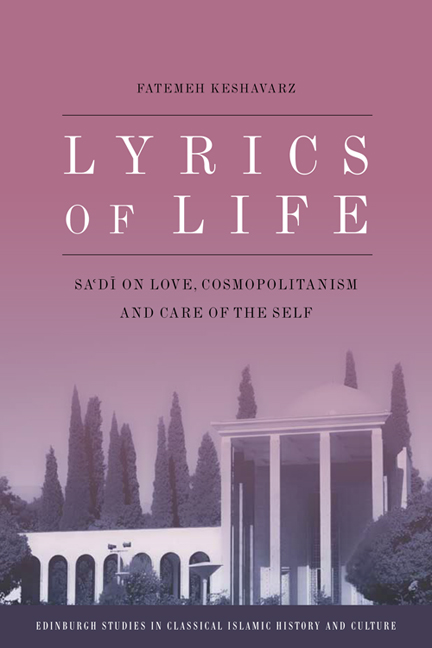Book contents
- Frontmatter
- Contents
- Acknowledgments
- 1 At the Brink of Writing: Which Doors to Open First?
- 2 Cosmopolitan Kinship: The Making of a Multi-world Subjectivity in the Poetry of Sa'di
- 3 Sa'di on Care of the Self: Ethical Games of Power in Practice of Freedom
- 4 “Every New Flower Arriving in the World”: Sa'di and the Art of Ghazal Writing
- 5 Gazing at the Garden of Your Beauty: Love in the Garden
- 6 My Poor Heart Sometimes Runs, Sometimes Whirls: Meet Sa'di the Comedian
- 7 Epilogue: Leaving the Garden Already? Here Are a Few Things I Hope You Take Along
- Bibliography
- Index
3 - Sa'di on Care of the Self: Ethical Games of Power in Practice of Freedom
Published online by Cambridge University Press: 05 August 2016
- Frontmatter
- Contents
- Acknowledgments
- 1 At the Brink of Writing: Which Doors to Open First?
- 2 Cosmopolitan Kinship: The Making of a Multi-world Subjectivity in the Poetry of Sa'di
- 3 Sa'di on Care of the Self: Ethical Games of Power in Practice of Freedom
- 4 “Every New Flower Arriving in the World”: Sa'di and the Art of Ghazal Writing
- 5 Gazing at the Garden of Your Beauty: Love in the Garden
- 6 My Poor Heart Sometimes Runs, Sometimes Whirls: Meet Sa'di the Comedian
- 7 Epilogue: Leaving the Garden Already? Here Are a Few Things I Hope You Take Along
- Bibliography
- Index
Summary
Poetry dedicated to ethics seems something of an oxymoron. After all, poetry is the domain of the ambiguous, the uncertain and the half-concealed. The joy and the energy it generates are rooted in these very uncertainties. We become active readers of poetry only after learning to discover in it that which is conducive to discovery. And to invent, without violating its overall logic, that that remains undiscovered.
In the domain of ethics, the rules of engagement are entirely different. Here, what is said, done, and even imagined, must be placed in the open, accessible to the public gaze. Everything is due for inspection: needs, fears, desires—and most of all—vices. It is, therefore, not accidental that much ethical teaching is reduced to predictable formulaic edicts with a self-righteous undertone. Neither is it surprising that often little is found—in the way of lyrical vitality—in the poetry created with the express goal of offering ethical guidance.
I hope to show in this chapter that if the poet in question is Sa'di and ethics is understood in the dynamic sense that Michel Foucault perceived it, the result could be different. Explored from Foucault's perspective, ethics is about a “conscious practice of freedom,” not about being tied to “the rigid vantage point of morality.” Interestingly, Sa'di 's approach to the subject also emerges as a strategy for care of the self with the hope of leading to self-governmentality. Our poet usually stands for a reflective and conscious participation in the ethical games of power as a means of preparing the reader to acquire the skill that Foucault has called the “practice of freedom,” a responsible and reflective freedom. One that is ethical.
I hope to also demonstrate that—unlike narrow, austere or punitive worldviews—Sa'di's ethical teachings embody a caring, pragmatic spirit and an entertaining humor, which bring them to life. And they do so without betraying their quiet and confident pedagogical mission. The mission remains a main priority without stifling the artistic play and surprise.
- Type
- Chapter
- Information
- Lyrics of LifeSa'di on Love, Cosmopolitanism and Care of the Self, pp. 79 - 107Publisher: Edinburgh University PressPrint publication year: 2014

